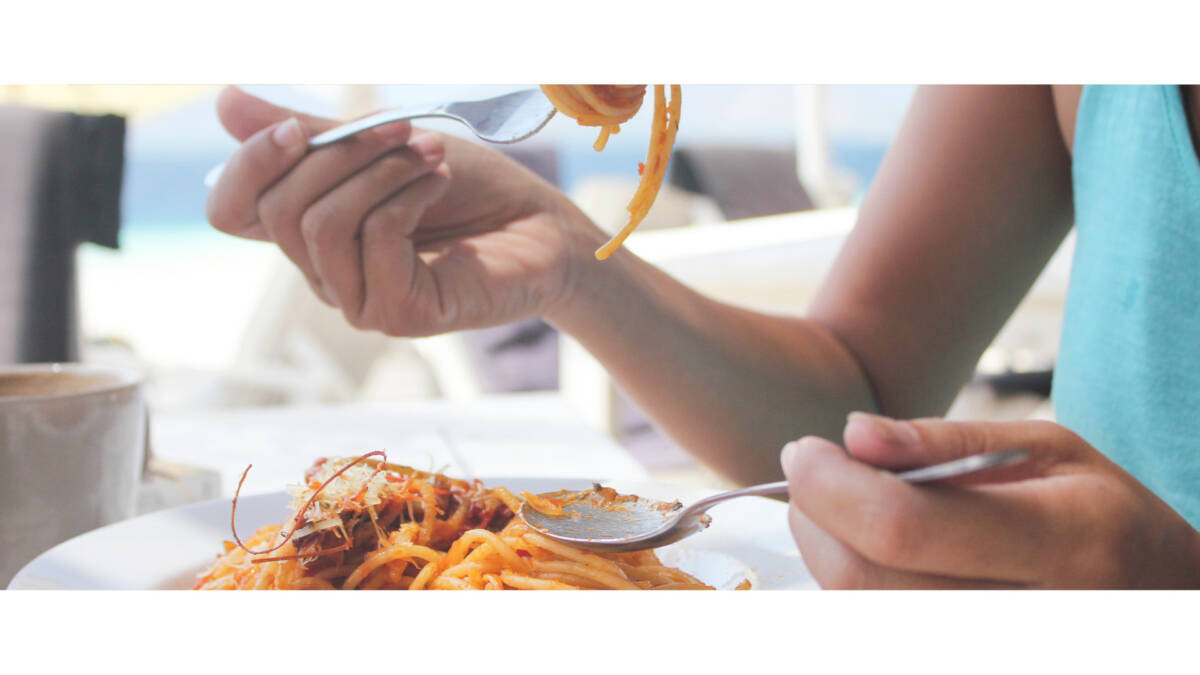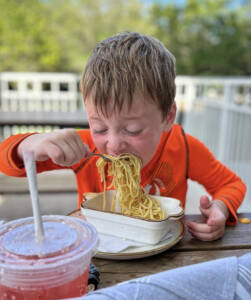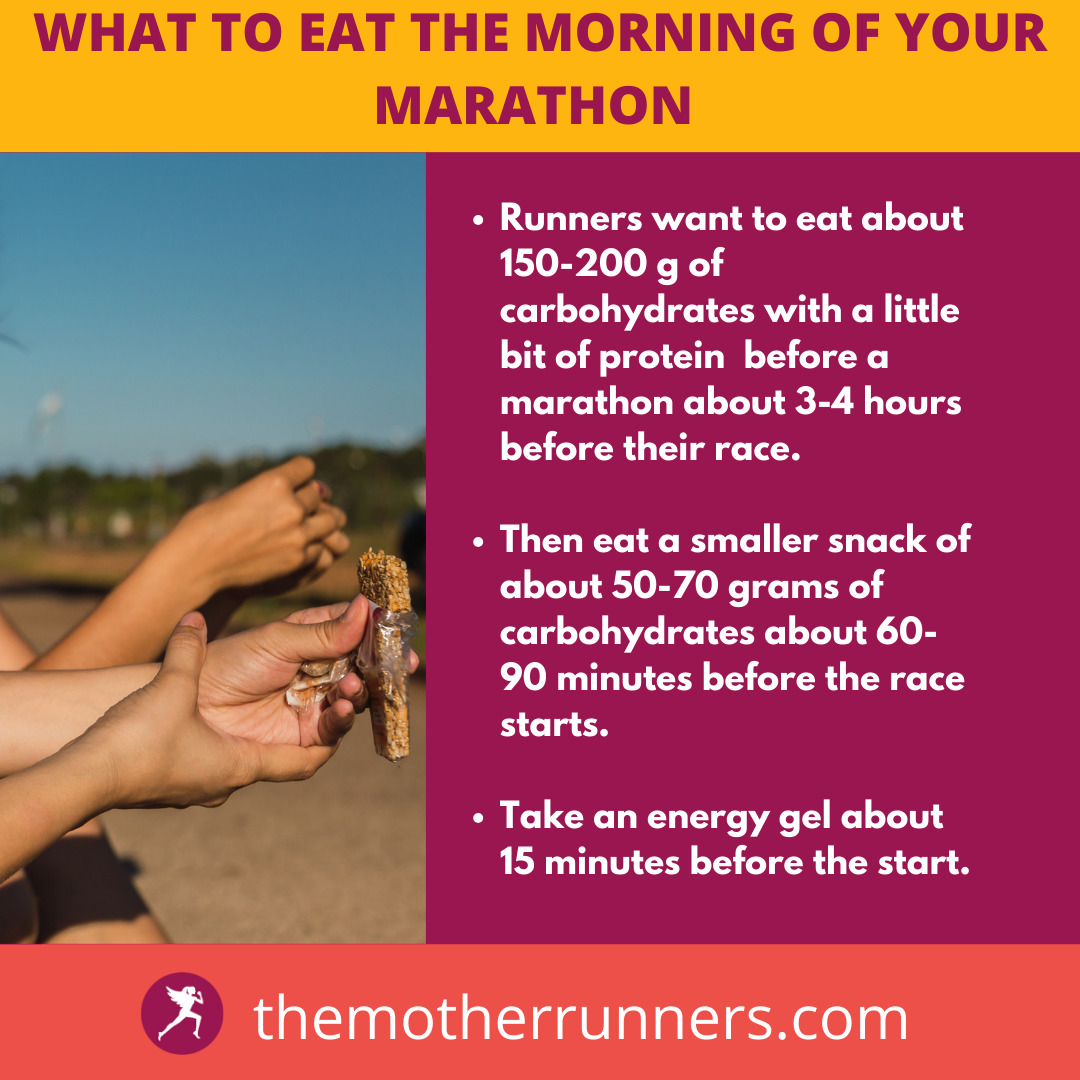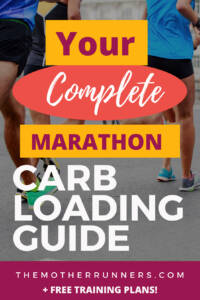Your body’s primary source of fuel for running comes from carbohydrates which are stored as glycogen in the body. The trouble is this source is limited to about 120 minutes of exercise. Runners who run long distances such as a marathon or half marathon need to carb load to maximize their fuel stores to run longer. Learn how below from registered dietitian Amy Stephens.

There is a science-backed way to improve your race performance by doing nothing related to running. What is it? Carb loading for a marathon or half marathon!
What you eat the days leading up to your marathon or half-marathon has the power to make or break your race. What you put in your tummy in those final hours to support or undo the months of training you’ve accomplished.
So, let’s nail how to carb load for a marathon or half marathon!
Pretty much every marathon runner has experienced hitting the wall aka bonking—when your body runs out of energy to keep running at a faster pace. It’s hard to keep moving forward, even at an easy pace.
Related: How to Recover from Hitting the Wall

What contributes to hitting the wall in a marathon is running out of glycogen stores (which come from carbohydrates). Your body can only hold so much and when you burn through them all, your body doesn’t have a quickly accessible source for fuel.
Related: Run to Lose Weight Safely (Top Tips & Mistakes)
So, when you’re running a marathon or half marathon, you want to make sure your tank is topped off to avoid or delay hitting the wall as much as possible to get that race PR!
For decades, runners have assumed that the way to stock their glycogen stores is to have a big pasta dinner the night before a marathon or half marathon. But this doesn’t accomplish the job AND it can lead to tummy troubles during your race.
So, how do you carb load for a marathon or half marathon? I got you! I got with registered dietitian who works with elites Amy Stephens to go over your complete carbo loading plan for a marathon and half marathon.
Skip Ahead
Ok, let’s get going!
What is carb loading?
Carb loading is when you eat more carbohydrates than normal ahead of an endurance event. The goal is to stock your glycogen stores (by eating carbs) so your body has more fuel to perform.
Why do runners carb load before a race?
Runners carb load before a marathon or half marathon or any long-distance race to give their bodies the fuel they need to go the distance.
Your body’s primary source of fuel for running comes from carbohydrates which are stored as glycogen in the body. Your body can access glycogen much faster than fat, so it uses carbs more readily than fat unless you’re running at a very easy pace.

Related: Why You Need to Run at an Easy Pace
The trouble is, your body can only store about 90-120 minutes’ worth of glycogen (or about 2,000 calories). So, when it runs out of glycogen stores, it taps into fat for its fuel.
But because fat is harder to convert to fuel (it takes longer and requires more energy), your body slows down. This is the proverbial wall marathoners hit—when you literally cannot run any faster no matter how hard your mind is wishing for it!
Thus, carb loading before a race helps runners stock the glycogen stores in the liver and muscles so they can run faster for longer.
Carbs also help your body retain water. This keeps your blood moving, getting oxygen to your working muscles.

Who should carb load?
Runners who are training for long-distance events that last longer than 90 minutes should carb load before the race and in their training.
The stomach is a muscle that needs to be trained, so it’s important to practice carb loading before your long training runs.
Related: The Scientific Benefits of the Long Run
It’s also important for runners to practice fueling during their long runs. Taking in fuel and teaching your stomach how to digest it with less blood flow will give your body more energy while it runs—delaying hitting the wall aka bonking.
Related: How to Train Your Gut
Carb loading for marathons
Unless you want to bonk (hit the wall) or are running very slow with a heart rate that is 120 or less, you want to carb load for a marathon!
How much should I carb load before a marathon?
Begin increasing your carbs at every meal, snack and drink. Aim for 6-10 grams of carbs for every kilogram of weight. Get this number by dividing your weight in pounds by 2.2 grams and then multiplying it by 6 up to 10 depending on your size.
What do I eat the night before a marathon?
Choose simple refined carbo, like pasta, white rice, potatoes, and bread. Avoid high-fiber foods. Then eat a carb-rich snack like crackers or granola before bed. Eat foods you are used to eating!
Can you run a marathon without carb loading?
Sure, but why? You are setting yourself up for failure in the form of bonking or hitting the wall by not carb loading before your marathon. Your body won’t have the fuel it needs in the form of glycogen, it’s main source of fuel, to go the distance!
What should I eat for carb-loading for a long distance race?

If you’re carbo loading for a marathon or half marathon, you want to focus on eating mostly simple and some complex carbs, plus lean proteins and veggies.
Megan Robinson, a registered sports dietitian, recommends taking in extra carbs through your drinks (including drinking more sports drinks and she likes tart cherry juice which reduces inflammation) and snacks.
You want to steer clear of really fibrous foods but eat some fiber so that you do not get constipated. Stick to foods you (and your stomach are familiar with!).
Some foods to eat when carb loading include:
- potatoes
- oatmeal
- quinoa
- rice
- pasta
- toast
- pancakes
- bagels
Related: How to Poop Before Your Race
Family-friendly meals for carb loading
Here are some carb-loading meal ideas that your family will eat too!
- Spaghetti and ground turkey meatballs a small side salad
- Chicken stir fry with veggies
- Make your own pizza with toppings including cheese, pepperoni, onion, peppers, sausage, spinach, etc.
- Sushi rolls including teriyaki chicken, salmon, or veggies with rice
- Turkey burger on a bun with a baked potato
- Chicken kabobs over rice
- Potato skins with cheese and tomatoes and spinach
Related: 26 Pro Marathon Training Tips for Race Day Success

The Official Carb Loading Guide for a Marathon & Half Marathon
Carb loading before a marathon or half marathon involves progressively eating more carbs at each meal over the course of several days.
7 days out from your marathon or 3 days out from half marathon:
- Begin increasing carbs at every meal and snack.
- Divide weight by 2.2 to get kilograms.
- Aim for 6-10 grams of carbs for every kilogram of weight. For example, a 130-pound runner can eat up to 590 grams of carbs a day.
- Eat about 1-1.3 grams of protein per kilogram of weight.
- Begin drinking lots of water and electrolyte drinks. Aim for 5-7 milliliters of water/electrolyte fluid per 1 kilogram of bodyweight.
- Eat less fat and fiber.
- Eat about 20-25 grams of fiber per day to keep things moving.
- Maintain this diet for the days leading up to the race.
Carb loading day before your marathon or half marathon:

- Aim for 8 to 12 grams of carbs per kilogram of weight.
- Eat the most carbs at lunch the day before your race.
- Eat a small carb snack the night before your race like some graham crackers.
- Limit fat and fiber.
- Double-down on hydration with water and sports drinks.
- Your plate will look like half carbohydrates, a quarter protein, and quarter vegetables.
Carb loading the morning of your race:
- 2-3 hours before your race, eat your usual breakfast with no new foods! This helps top off stores.
- Aim for 3 grams of carbs per kilogram of bodyweight if 3 hours before and 2 grams if it’s 2 hours before.
- Drink 8-16 ounces of sports drink.
- Take an energy gel at the start line to top off stores one more time.
Related: Marathon Fueling 101: What Runners Should Eat
By the way, if this all seems too complicated, Robinson recommends in the days leading up to your marathon (even just two days):
- aim for your plate to be half carbs
- drink sports drinks and juices
- eat carb-rich snacks
She also warns that carb depletion (where you eat little carbs before carb loading) is not a practice backed by science.
The day before your long run, focus on eating about 25 percent more carbs at every meal and snack.
7 additional carb loading tips for runners
Here are seven carbo loading tips for success before your marathon or half marathon!

- Practice carb loading. Before your long runs, practice carb loading. This will help your body learn how to store glycogen and how to use it efficiently. It will also help prevent tummy upset. You don’t need to carb load as much as you would before your race because you won’t be running as long or as intensely.
- Be prepared for weight gain. The week of your race, you will gain weight. That’s because carbs help your body retain water. This is a double whammy of benefits for your race performance. Your body has fuel to burn and fluids to keep it hydrated. If you weigh yourself for your race and are heavier, that is a signal your carb loading is working!
- Avoid the pasta dinner. Eating a carb-heavy meal the night before your marathon or half marathon isn’t going to help your performance. It could hurt it, actually. Eat your biggest carb meal at lunch the day before your race. This will give your body time to digest and stock its stores.
- Steer clear of fatty and fibrous foods. Avoid fatty and oily foods. Eat foods that are not full of fiber. You want some fiber (20-25 grams daily) to keep you regular. But you don’t want too much so that you are going to the bathroom every twenty minutes.
- Stay with what you know. Don’t try new foods before a race just because you’re in a new city for your marathon. Eat foods you’re comfortable with. If you eat out, order something that is plain. You can just order plain chicken and veggies to avoid oily sauce. Boring is the name of the game when it comes to carb-loading the night before a marathon.
- Don’t forget to drink! Hydrating is as important as carb-loading before a marathon. So don’t forget to keep that water bottle close in the week leading up to a race! Aid your carb loading by drinking water and electrolyte drinks throughout the day.
- A coach can help! If you want guidance with your half marathon and marathon goals, check out my run coaching services. Also, be sure to check out my free training plans:
- Postpartum Training Plan
- After a Break Training Plan
- 5k Training Plans
- 10k Training Plans
- Half Marathon Training Plans
- Marathon Training Plans
- Strength Training Plan
